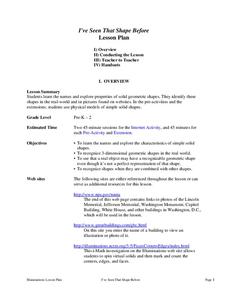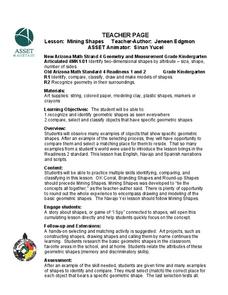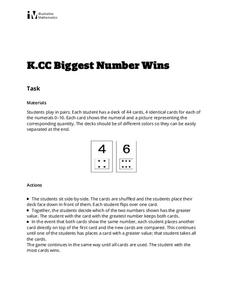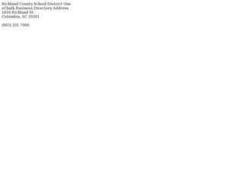Curated OER
Shapes Galore!
First graders create two-dimensional shapes. In this shapes lesson, 1st graders learn about different two-dimensional shapes. Students have many hands-on experiences with these shapes including the use of geoboards, shaving cream, yarn,...
Fayetteville Public Schools
I've Seen That Shape Before
The objectives in the resource allow young scholars to explore the characteristics of simple solid shapes. Youngsters learn to recognize the face shapes, corners, and edges that make up 3-D figures by filling in a chart....
Curated OER
Patterns, Relations, and Functions: Geometric Shapes
Young scholars explore patterns involving objects or figures and geometric shapes. They identify the missing shapes in patterns and discuss what would come next in the pattern, analyze patterns using different objects, and complete a...
Bowland
Water Availability
Just how scarce is water in different parts of the world? Through these water lessons, young data analysts use provided data to investigate the scarcity of water in countries of the Middle East and Africa. They use ratios and rates to...
Curated OER
Stochastic and Deterministic Modeling
Explore the difference between stochastic and deterministic modeling through programming. First have the class write algorithms for relatively simple tasks using pseudocode. Use the Python 2.7 program app to simulate Mendel's Pea Pod...
EngageNY
The Angle-Angle (AA) Criterion for Two Triangles to Be Similar
What do you need to prove triangles are similar? Learners answer this question through a construction exploration. Once they establish the criteria, they use the congruence and proportionality properties of similar objects to find...
Curated OER
Writing Correct Number
In this math practice worksheet, students solve 6 problems that require them to recognize numbers and count pictures objects.
Arizona State University
Mining Shapes
Youngsters recognize and identify shapes. They draw, and use modeling clay to make shapes. They also identify shapes in their environment and in the Navajo culture, then compare the shapes and sort them into groups. This is the...
Illustrative Mathematics
Biggest Number Wins
Engage your mathematicians with this simple number-quantity game. Working in pairs, using two decks of 44 cards numbered 0-10 with corresponding sets of objects or images, young learners will each flip a card and decide...
Curated OER
Vectors: How Much Force Can You Apply
This lesson entails the viewing of two videos to get an overview of force and its application. The lesson covers how vectors use force in real-world situations.
Curated OER
Physics: Forces and Motion
Students recognize the effect of Earth's gravity on an object's weight. For this force and motion lesson students understand the role of gravity when you drop an object. Students experiment with small items. Students measure in Newton's....
Curated OER
Shapes Galore!
First graders explore two-dimensional shapes. Individually, children follow directions to draw shapes. Learners use shaving cream, geoboards, yarn, marshmallows, and toothpicks to create shapes. As a class, 1st graders brainstorm...
Curated OER
One Good Turn Deserves Another
Students make observations about shapes and 1-, 2-, and 3-dimensional objects. They conduct observations and make predictions regarding transformations of simple geometric shapes. They identify shapes that occur in household items.
Curated OER
A World of Symmetry
Students identify lines of symmetry. In this symmetry lesson plan, students create objects and identify their lines of symmetry. They answer questions about lines of symmetry. Students cut shapes out of cookie dough and...
Ohio Department of Education
I Can Name that Angle in One Measure! - Grade Eight
Collaborative groups work with geometry manipulatives to investigate conjectures about angles. They create a graphic organizer to use in summarizing relationships among angles in intersecting, perpendicular and parallel lines cut by a...
Curated OER
Internet Measurement
Students become familiar with how to get information from the Internet. In this math and technology lesson plan, students measure objects on a measurement sheet found on a web site. They practice using a standard unit of measurement...
Curated OER
Place Value: Tens and Ones
In these recognizing tens and ones worksheets, students count the rods and units and write the numbers in the tens and ones columns, write the correct numbers for the given tens and ones, covert words to the correct numerals, and...
Curated OER
Left and Right Worksheet - Pairs of Shapes
In this position of objects worksheet, students practice recognizing left and right by following the coloring directions for the items in each of 6 boxes.
Curated OER
Left and Right Worksheet - Colored Shapes
In this positions of objects worksheet, learners practice recognizing left and right by circling the shapes according to the directions for 6 exercises.
Curated OER
Terrific Tessellations
Students explore tessellations that are found in nature and everyday objects. They observe the works of M.C. Escher. Students create their own tessellations using pencil and paper.
Curated OER
Arrange the Classroom (Part 1 of 3)
Fifth graders arrange the classroom using all the moveable objects and through the exploration of area and perimeter. They determine the area of the classroom, create and label model pieces of furniture using graph paper, and create a...
Curated OER
Algebra: What's My Rule?
Students apply higher level thinking skills to determine rules for sorting and classification. In this pre-algebra lesson plan, students nominate classmates who they think satisfy the unspoken "rule" established by the leader. As...
Curated OER
The Grouchy Ladybug
Students learn about sorting and classifying objects by size while reading Eric Carle's "The Grouchy Ladybug". In this sorting and classifying lesson, students first listen to and interact with the story. They then look at cut-outs of...
Curated OER
100 Day Chick Hunt
Students investigate how to count to the number 100 with the connection to using chicks as objects. They use cutouts of chicks and place them into the counting chart and recognize the different numerals while counting at the same time.























